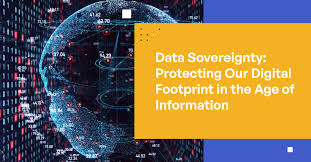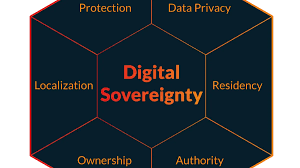In a world increasingly driven by algorithms and cloud infrastructure, the question of who controls data—arguably the most valuable resource of the digital age—has never been more urgent. While tech giants like Google, Amazon, Meta, and Microsoft claim to offer tools that empower users, critics argue that these companies have become de facto governors of the digital world. This has sparked a global push for digital sovereignty, where nations aim to reclaim control over their citizens’ data, digital infrastructure, and technological ecosystems.
What Is Digital Sovereignty?
Digital sovereignty refers to a nation’s ability to control its own digital infrastructure, data policies, and technological standards, free from foreign or corporate influence. It’s about ensuring that a country’s data, AI systems, and communications infrastructure align with its laws, values, and interests.
For example, the European Union’s emphasis on data localization laws and regulations like the General Data Protection Regulation (GDPR) are key components of its digital sovereignty agenda. These frameworks are designed to ensure that personal data of EU citizens remains within the bloc and is subject to European laws, not those of foreign corporations or governments.
The Role of AI Geopolitics
The rise of artificial intelligence has transformed digital sovereignty into a high-stakes issue of AI geopolitics. As AI becomes more integral to everything from healthcare and finance to national security, controlling AI infrastructure and data flows equates to holding geopolitical power.
Countries like China, the U.S., and the EU are not just competing over economic and military dominance—they’re vying for leadership in AI development, data access, and cloud computing capabilities. Tech giants, many of which are headquartered in the U.S., play a pivotal role in this struggle. Their platforms power global AI models, store vast datasets, and define the standards for digital interaction.
This makes the line between corporate and national interests increasingly blurry. Are these companies neutral service providers, or are they proxies in a new form of digital imperialism?
The Limitations of Data Protection Frameworks
Governments have responded by developing data protection frameworks intended to balance privacy, innovation, and security. GDPR remains the most well-known, but similar policies are being adopted globally—from Brazil’s LGPD to India’s Digital Personal Data Protection Act.
However, these frameworks often struggle to keep pace with the technological realities of global cloud infrastructure and AI training models. Data might be technically stored in a compliant region but still accessible by parent companies based in jurisdictions with different laws—raising concerns about surveillance, data misuse, and lack of recourse for citizens.
Moreover, enforcement remains inconsistent, and regulatory capture by well-funded tech firms often undermines legislative intentions. While fines are issued, they are rarely enough to change the fundamental behaviors of trillion-dollar companies.
Reclaiming Control: Can States Win the Digital Tug-of-War?
Some nations are attempting to level the playing field by investing in sovereign cloud services, developing national AI strategies, and forming alliances like the EU’s GAIA-X initiative—a federated data infrastructure intended to challenge the dominance of U.S. and Chinese cloud providers.
Others, like China, pursue more aggressive models of digital sovereignty through strict regulation, surveillance, and domestic tech ecosystems—raising human rights concerns even as they reduce foreign dependency.
But the path to digital sovereignty isn’t about building walls; it’s about building resilient, accountable systems that prioritize democratic values, data transparency, and citizen control.
Conclusion: Who Governs Your Data?
The truth is, most people don’t know where their data lives or who accesses it. As AI continues to evolve and integrate into daily life, the stakes are no longer just personal—they are political, economic, and ethical.
Digital sovereignty is not merely a buzzword. It is the frontline in the battle over who controls the future: democratic institutions accountable to the public, or a handful of tech giants accountable only to shareholders. In the age of AI geopolitics, this question will define not just privacy policies, but the very structure of power in the 21st century.







